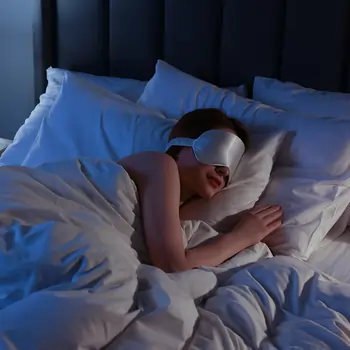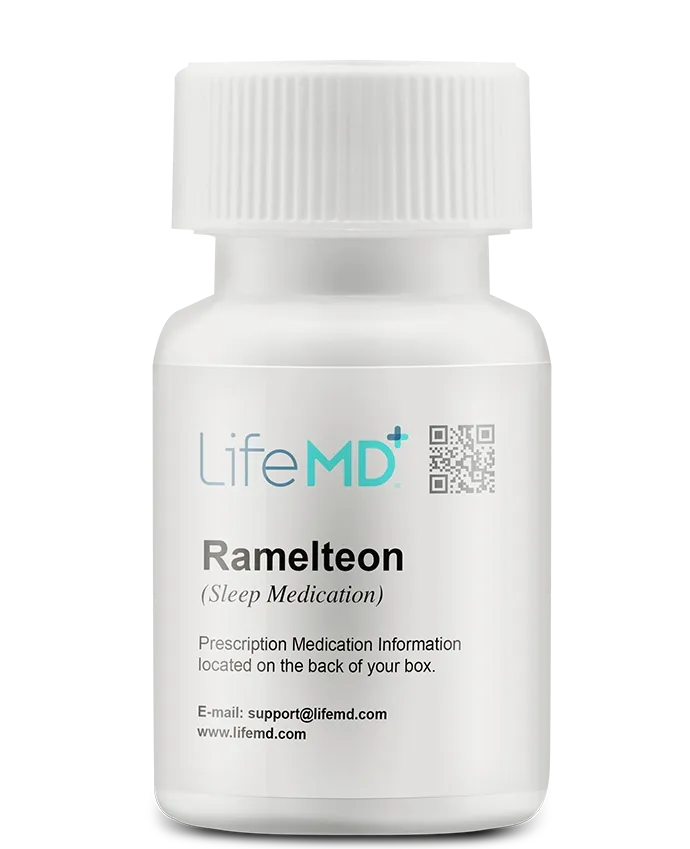Does Sleep Apnea Go Away?
Sleep apnea is a serious health issue that affects millions of Americans.
The American Sleep Apnea Association (ASAA) estimates that nearly 22 million people in the U.S. are living with this condition.
Not only does sleep apnea prevent you from getting a good night’s rest, but it also causes daytime drowsiness and headaches that can make daily tasks feel extremely difficult.
Sleep apnea can also contribute to chronic and sometimes life-threatening medical conditions if left untreated.
This article will discuss what sleep apnea is, the causes, risk factors, and treatment options to help manage symptoms.
Tired of restless nights?
Don’t let insomnia hold you back. Take the first step towards better sleep with LifeMD.


What is Sleep Apnea?
Sleep apnea is an ailment where breathing is repeatedly obstructed while sleeping. This causes the person’s breathing to suddenly stop and then start again.
Obstructive sleep apnea occurs when a person’s airway becomes partially or fully blocked by their tongue or neck tissue. The breathing interruptions can last for several seconds at a time.
This obstruction causes oxygen levels to drop and prompts the body to wake up as a way to reopen the airways. Sleep apnea patients usually wake with a snort, choke, or gasp.
If this pattern repeats throughout the night, it can prevent people from getting a night of deep and restful sleep.
Key Point: What is Central Sleep Apnea (CSA)?
Central sleep apnea (CSA) is another form of this condition and occurs when the airway becomes blocked when the brain fails to communicate with the respiratory system.
However, this form of sleep apnea is less common. The ASAA estimates that only one in five sleep apnea patients have CSA.
What Causes Sleep Apnea?
There are a few different factors that can contribute to the development of sleep apnea.
Most of these are controllable, which means that there are ways to manage and reduce the severity of sleep apnea.
Weight gain and obesity
The link between weight gain and obstructive sleep apnea is well-established. Research shows that excessive weight gain increases the likelihood of developing sleep apnea.
This is because weight gain can cause tissue in the back of the airway to enlarge. This tissue can sag or drop down and obstruct the flow of air while a person sleeps, causing a breathing disruption.
Chronic snoring
When you snore, vibrations are sent through your airway. These vibrations can contribute to swelling and nerve receptor damage.
These factors can increase the risk of developing obstructive sleep apnea because they narrow the airway and weaken the muscles that keep it open.
Other factors
Additional factors that can contribute to the development of sleep apnea include:
Sleeping on your back since this position can allow the tongue to fall into the airway and obstruct it.
Drinking alcohol a few hours before going to sleep.
What are the Symptoms of Sleep Apnea?
There are various signs and symptoms of mild sleep apnea. These may include:
Snoring
Waking abruptly
Night sweats
Dry mouth
Sore throat
Morning headaches
Daytime sleepiness
Depression
People who have sleep apnea may also experience fatigue and mood swings because they’ve struggled to get a good night’s sleep.
Without proper treatment, severe sleep apnea can lead to more serious health problems, including:
High blood pressure
Increased risk of developing heart disease
Risk of developing diabetes
Increased risk of strokes
Key Point: Can You Die from Sleep Apnea?
Nearly 38,000 Americans die from sleep apnea-related conditions each year.
Untreated sleep apnea can lead to serious and potentially life-threatening conditions. These include:
- Cardiac arrest or congestive heart failure
- Diabetes
- High blood pressure
Managing and Treating Sleep Apnea Risk Factors
Although sleep apnea can’t be cured, there are a number of treatment options that can help you manage and reduce some associated risk factors.
Congestive heart failure
High blood pressure
Diabetes
Parkinson’s disease
The effects of smoking and drinking
Let’s take a look at what you can do to manage them by relieving your sleep apnea symptoms.
Weight loss
Losing weight is an extremely common and effective sleep apnea treatment. Most people who struggle to manage sleep apnea symptoms find that they sleep better after losing excess weight.
Research has found that people who lose weight reduce excess tissue that often obstructs their airway and may even reduce the size of their tongues.
It also improves your general health and reduces the risk of developing heart disease and other medical issues.
Healthcare professionals agree that losing at least 10% of your body weight is the best way to see a significant improvement in sleep quality.
It’s also recommended that you seek medical advice to ensure you lose weight in a healthy and safe way.
CPAP therapy
Continuous positive airway pressure (CPAP) is a way to treat obstructive sleep apnea with a specialized device.
This process involves a sleep medicine specialist who will provide you with a CPAP mask to wear at night.
A CPAP mask helps to relieve symptoms and make falling asleep easier. It also ensures that you get a good night’s rest.
The mask is often a critical first step in managing or resolving sleep apnea.
Surgery
Major surgical options like jaw advancement surgery, however, may be considered to effectively reduce sleep apnea in teenagers and adults.
It restructures the jawbones to change the proportions of your face and improve the flow of oxygen through your airway.
Other surgical procedures include:
Surgery on the soft palate
Septoplasty (reconstruction of the nose to prevent nasal congestion)
Radiofrequency treatment that relieves congestion and obstruction in the nasal passages
Tongue surgery
It’s important to note that the above options may not always be effective, so consult with your doctor to find out if you’re a suitable candidate for surgery.
Sleep apnea in children can usually be treated and even cured if it’s detected early. Treatment options include:
Tonsil and adenoid (large lymphatic tissue) removal
Taking allergy medication to avoid a narrow or inflamed airway that can damage the surrounding tissue and muscle
Orthodontic therapy (dental reconstruction to prevent obstructive sleep apnea caused by misaligned teeth)
Lifestyle changes
Other than weight loss, there are a few lifestyle changes that may help relieve the symptoms of sleep apnea. While these changes won’t necessarily cure sleep apnea, they can make it more manageable.
These include:
Quitting smoking
Avoid sleeping on your back
Reducing the amount of alcohol you consume and avoiding drinking near bedtime
Exercising regularly to improve cardiovascular health and lower the risk of developing heart disease
Avoiding taking sedatives that can relax the muscles too much
Living a generally healthy lifestyle
Can You Overcome Sleep Apnea?
Sleep apnea is a lifelong condition with no known cure. However, there are many treatment options that can make living with this condition more manageable.
Some surgical procedures have even been successful in helping sleep apnea patients overcome the condition. Consult with a specialist to see if surgery is the right option for you.
Feeling overwhelmed and frustrated with sleep apnea is normal. If you are concerned about how it may be affecting your mental health, make an appointment to see your healthcare provider.
Are You Having Trouble Sleeping?
Sleep apnea is an often chronic condition that can contribute to a poor night’s rest and serious health problems. If you’re experiencing some of the symptoms we’ve covered in this article, LifeMD may be able to help.
Don’t let insomnia control your nights. LifeMD-affiliated physicians can prescribe FDA-approved, non-addictive medications to help you fall asleep faster. Start your treatment today.













